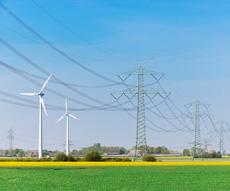VTT Technical Research Centre of Finland has joined forces with Lappeenranta University of Technology and the Finland Futures Research Centre at the University of Turku in the launch of an extensive development project for a brand new energy system and its associated business sector in Finland. The Neo-Carbon Energy project, targeting the storage of solar and wind energy, has been granted major strategic funding by Tekes – the Finnish Funding Agency for Innovation for next couple of years.
 The reduction of greenhouse gas emissions and endeavors to achieve energy self-sufficiency are boosting the development of emission-free energy production. Germany has thus far led the development of solar and wind power but the momentum appears to be shifting towards China and Asia. This development may well enable a genuine third energy choice alongside nuclear and fossil sources.
The reduction of greenhouse gas emissions and endeavors to achieve energy self-sufficiency are boosting the development of emission-free energy production. Germany has thus far led the development of solar and wind power but the momentum appears to be shifting towards China and Asia. This development may well enable a genuine third energy choice alongside nuclear and fossil sources.
For Finnish trade and industry, a new energy system and its associated technologies could provide a significant opportunity to succeed in the global market. The Neo-Carbon Energy project creates competencies that will open doors for Finnish companies to take part in the international R&D conducted around energy production. The aim is to create a competence base and potential testing areas, enabling Finland to demonstrate that it belongs among the global elite within the field.
“Solar and wind energy can provide major opportunities to create new jobs and export products for Finland,”said Pasi Vainikka, Project Coordinator and Principal Scientist at VTT. “The purpose of the project is to develop an energy system based on the storage of energy in the form of hydrocarbons, in other words conventional fuels.”
Households included in the emission-free energy system
An emission-free energy system based on solar and wind energy is a major challenge to develop due to varying levels of supply. This kind of energy production will also be divided into much smaller units than today, even with individual households acting as energy suppliers.
In the future, households may play a significant role as suppliers of electric power to the local but also national grid. They may be able to get the excess electricity stored by energy service providers or they could sell this energy and buy it back as fuel for cars, for example.
Besides new energy storage technologies and services, the change also requires the creation of legislation related to the energy business, to energy markets and new business chains. Finnish legislation does not yet take account of the needs of new forms of energy, their distribution and storage, including the trade in solar and wind energy generated by private citizens.
Variable supply of solar and wind energy offers challenges
The challenge facing the extensive exploitation of the third energy option is how to integrate electricity, heating, industrial and transport sectors to use the variable solar and wind energy sources. In the electric system in particular, supply and demand must be in perfect balance.
Hydrocarbons produced using solar and wind power, such as synthetic natural gas, could already be stored and utilized in the existing energy system. The system would be carbon-neutral because the carbon cycle in the electric power system would be closed, and emissions from transport and industry would be recycled using atmospheric carbon as a source of carbon for the energy system.
The change in the energy system would also bring about positive socioeconomic changes: energy self-sufficiency and the reduction of energy poverty in developing countries.
The Neo-Carbon Energy project
The Neo-Carbon Energy project strives at placing Finnish industry in pole position in the development of the energy system of the future. This multidisciplinary research project focuses on the operating principles, technologies and social impacts of the system. It aims to generate a view of the needs of an emission-free energy system primarily based on solar and wind power, the system’s business opportunities and its societal implications.
The project develops, for example, large-scale energy storage connected to the electric distribution network and its integration into other energy sectors.
“The project hits the strategic core of Lappeenranta University of Technology operations: green energy and collaboration with excellent partners. We can refine our strong competencies in energy markets, electrical engineering, energy and environment technologies in the development of a new energy system. We believe that the project will lead to even more extensive cooperation with international top universities”, says Professor Christian Breyer from Lappeenranta University of Technology.
“The foresight competence of Finland Futures Research Centre at the University of Turku will target, identify and interpret changes in the operating environment and the opportunities provided by them,” said Professor Sirkka Heinonen from Finland Futures Research Centre at the University of Turku. “We will pay special attention to the radical innovations generated through systemic change. Any transition in the energy system will be perceived in the context of society as a whole and in changes of lifestyle. The potential business opportunities for Finland will be explored in consideration to changes in the global energy landscape, using examples from Chinese and emerging African markets.”
Total budget of the project is 7 Million EUR. Tekes has granted a funding of 5 Million EUR for 2014-2016.
The project is divided into three parts: futures research related to global challenges and energy systems; the development of energy systems, and the enhancement of competencies related to the development of energy storage technologies.
This project is one of the new strategic research openings funded by Tekes. The strategic openings are visionary research projects, which are expected to create significant expertise and new business in Finland. Finnish companies will have an active role in applying the results.
VTT Technical Research Centre of Finland
www.vtt.fi
Filed Under: Energy storage, News




